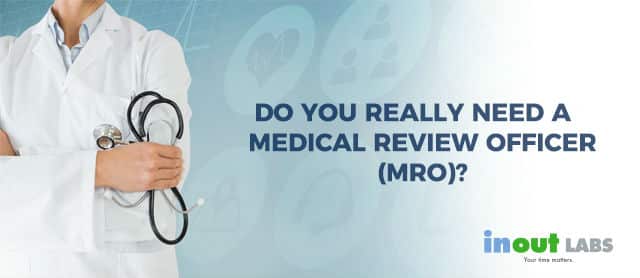Yes.
A BIG FAT yes.
Some companies mistakenly think that getting drug test results directly from a lab or from an in-house-administered instant test is good enough. And after reading this, they may still consider it worth the risk. But make no mistake. There are risks. Ultimately, you are responsible for ensuring a fair, reliable drug testing program, and a Medical Review Officer plays a key role in making that happen.
If your employees are regulated by the U.S. Department of Transportation (DOT), and your testing program is compliant, then you’re good. The Medical Review Officer (MRO) is built in to compliant programs.
But, if your employees are non-DOT, you have a lot more choices in how you conduct your drug testing program. Some choices are better than DOT (i.e. test for more drugs), and others could put you at risk—particularly if the program leaves out the Medical Review Officer.
If you, as the employer, receive raw test results directly from a lab or from an instant test your staff conducts, and test results are positive, you now have sensitive information that could expose you to liabilities. Let’s say, that amphetamines turn up positive—or codeine, benzodiazepines or another prescription drug that the donor may or may not have a scrip for.
Now what?
Now you need to find out if it’s legit. Do you really want to know if an employee is being treated for some condition that is protected by the ADA (Americans with Disabilities Act), for example? Is it any of your business? (And again, do you really want to know?) Not likely. What if you have to let this person go? Do you want to chance a discrimination lawsuit because of the knowledge you have of their health condition?
The Medical Review Officer is the gatekeeper of highly sensitive information, and the only qualified professional who can determine whether the use of prescription medications is appropriate or will cause a safety concern. Of if it’s substance abuse.
The MRO protects your rights as an organization, and ensures a fair process for the employee.
Positive drug test results not reviewed by an MRO are easily challenged in court too. Especially if they are POCT (Point of Care Testing), or instant test that are not confirmed in a certified laboratory and subsequently reviewed by the medical review officer.
What Else Does the MRO Do?
The MRO’s role in the drug testing process goes beyond interpreting results. The medical review officer is a licensed physician with medical training to interpret and evaluate drug screening results. They have experience teasing out the difference between a positive result because of a prescription, for example—or a positive because of substance abuse.
The MRO owns the integrity of the drug testing process.
The Medical Review Officer will:
- Confirm that the Chain of Custody is intact and that information on the drug testing Custody and Control Form (CCF) is complete and defensible.
- Confidentially interview the donor to ask questions about a positive test.
- Deliver confirmed lab results to the ordering agency (your business); and work between the donor and the lab.
When errors are discovered, the MRO provides corrective action notices, or cancels the test. Maintaining accurate paperwork is an integral part of a successful drug testing program. That’s why MROs should review all drug test results—not just negative results that require further investigation.
Choose A Drug Testing Partner that Contracts with an MRO.
At InOut Labs, we act as administrator and, sometimes specimen collector. We use HHS certified labs and independent MROs, so you can rest assured that the drug testing process is accurate and fair, and protects your business.
Our MRO office has five full-time MROs and 12 MRO assistants. Combined with a state-of-the art software platform, we can deliver drug test results without any undue delays.
Find out how you can improve the integrity of your drug testing process.
Why not schedule a short call today?
Image Credit: Designed by Freepik

